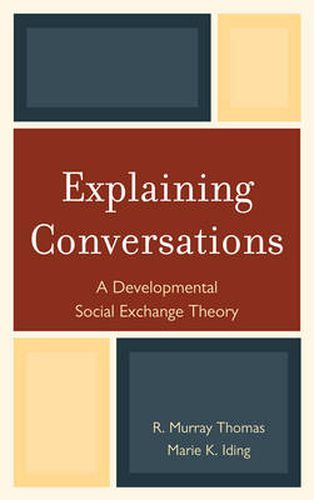Readings Newsletter
Become a Readings Member to make your shopping experience even easier.
Sign in or sign up for free!
You’re not far away from qualifying for FREE standard shipping within Australia
You’ve qualified for FREE standard shipping within Australia
The cart is loading…






Explaining Conversations offers a different way of interpreting people’s social exchanges than has been available in the past. The book is replete with examples of people’s verbal interactions in the form of chats, arguments, debates, and negotiations, both within a culture and across cultures. The volume’s subtitle, A Developmental Social-Exchange Theory, identifies a theme featured in Chapters 2 and 5-the typical pattern by which social-exchange skills evolve over the first two decades of life. Throughout the book, the underlying meanings of conversations are interpreted in terms of (a) the needs people seek to fulfill through their conversations, (b) the influence of a person’s culture on what is said, © individuals’ patterns of thought (metacognition) during a conversation, (d) how people’s expectations about a conversation affect what they will say, and (e) strategies individuals adopt to achieve their goals. The book includes a chapter designed to guide parents and teachers in promoting young children’s and adolescents’ social-exchange skills.
$9.00 standard shipping within Australia
FREE standard shipping within Australia for orders over $100.00
Express & International shipping calculated at checkout
Explaining Conversations offers a different way of interpreting people’s social exchanges than has been available in the past. The book is replete with examples of people’s verbal interactions in the form of chats, arguments, debates, and negotiations, both within a culture and across cultures. The volume’s subtitle, A Developmental Social-Exchange Theory, identifies a theme featured in Chapters 2 and 5-the typical pattern by which social-exchange skills evolve over the first two decades of life. Throughout the book, the underlying meanings of conversations are interpreted in terms of (a) the needs people seek to fulfill through their conversations, (b) the influence of a person’s culture on what is said, © individuals’ patterns of thought (metacognition) during a conversation, (d) how people’s expectations about a conversation affect what they will say, and (e) strategies individuals adopt to achieve their goals. The book includes a chapter designed to guide parents and teachers in promoting young children’s and adolescents’ social-exchange skills.